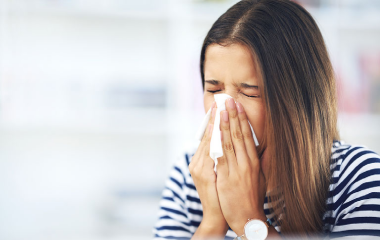Seasonal allergies can have a significant impact on our daily lives, including our ability to get a good night’s sleep. As the seasons change, many people suffer from allergies due to the increase of pollen, dust, and other allergens in the air. These allergies can cause a range of symptoms that can disrupt our sleep patterns and leave us feeling tired and irritable.
Allergy symptoms make it hard to get a good night’s rest
One of the most common symptoms of seasonal allergies is nasal congestion. This can make it difficult to breathe through the nose, which can lead to snoring or worsen obstructive sleep apnea. When we sleep, our muscles relax, including the muscles that keep our airways open. When we have allergies, the congestion often leads to mouth-breathing, which can make it even harder to keep our airways open, leading to disrupted sleep.
Another common symptom of allergies is itching, particularly in the eyes and nose. This itching can be especially bothersome at night, making it hard to fall asleep and stay asleep. Additionally, scratching can lead to inflammation and swelling, which can worsen congestion and make breathing even more difficult.
Seasonal allergies can also cause sneezing and coughing, which can be disruptive to sleep. Sneezing and post-nasal drip with persistent nighttime cough can disrupt our sleep, wake us up, and make it hard to fall back to sleep. Additionally, these repeated movements can cause muscle soreness and fatigue, which can further impact our ability to get a good night’s rest.
Allergies can also lead to fatigue. This can make it hard to stay awake during the day and can lead to difficulties concentrating or focusing. When we are tired, we are also more prone to accidents, both at home and at work.
Address allergies to sleep better
Fortunately, there are some steps we can take to help alleviate the symptoms of seasonal allergies and improve our sleep quality. One of the most important things we can do is to try to reduce our exposure to allergens. This may mean staying indoors during peak allergy season, using air purifiers, or wearing a mask when we are outside. The Asthma and Allergy Foundation of America offers additional tips for controlling allergens at home.
We can also try using over-the-counter medications, such as antihistamines, decongestants, and nasal sprays. These medications can help reduce inflammation and alleviate congestion, making it easier to breathe and sleep. Additionally, consider nasal saline spray or irrigation to help flush out allergens and alleviate nasal congestion.
Remember also that seasonal allergies can trigger asthma flare and cause sinus infection in those who are at risk. Optimizing treatment of these co-existing conditions will improve sleep health and general well-being.
It is also important to maintain healthy sleep habits. This means establishing a regular sleep routine, avoiding caffeine and alcohol before bed, and creating a cool, quiet, and comfortable sleeping environment.
Don’t let seasonal allergies ruin your sleep
Seasonal allergies can be a nuisance, but with a little effort, we can minimize their impact on our sleep and daily lives. By taking steps to reduce our exposure to allergens and utilizing medications and good sleep hygiene practices, we can get the restful sleep we need to feel our best.
Medical review by John Saito, MD





